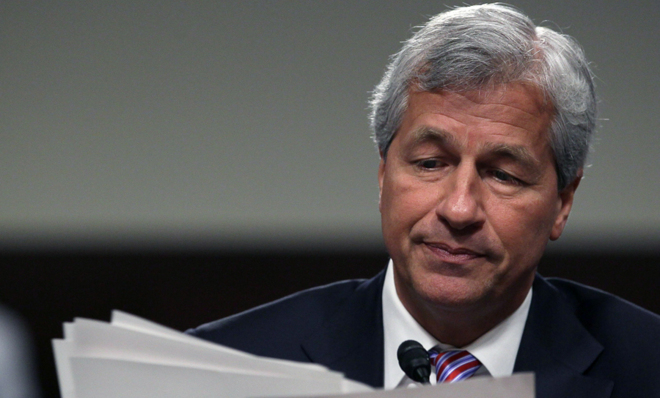JPMorgan in Washington's crosshairs
The biggest U.S. bank is discussing an $11 billion payment to settle government investigations related to the mortgage crisis

A free daily email with the biggest news stories of the day – and the best features from TheWeek.com
You are now subscribed
Your newsletter sign-up was successful
"Washington is looting JPMorgan," said The Wall Street Journal in an editorial.
The biggest U.S. bank is discussing a staggering $11 billion payment to settle a welter of government investigations into its handling of mortgage-backed securities. Yet it makes no sense to cast JPMorgan as "the great villain of the mortgage crisis," said The Journal. This was the one big bank that didn't need a bailout. It "avoided the credit excesses that ruined so many competitors," and even stepped in at the government's urging to buy the troubled firms Bear Stearns and Washington Mutual. So why has its CEO, Jamie Dimon, become "the Obama administration's favorite Wall Street target"? Partly it's because the government wants payback for last year's $6 billion London Whale trading loss, which "punctured the Beltway myth" that Washington regulators were finally on the ball. But Dimon's main sin is that he "keeps deviating from the Obama script" by criticizing the Dodd-Frank Act's wrongheaded financial reform measures. Clearly our feckless politicians hope to teach a painful lesson "to any banker who dares to disagree with his Washington bosses."
They may not stop until they have Dimon's scalp, said Charles Gasparino in the New York Post. It doesn't matter to "the Obama administration and its cronies" that Dimon has the strong support of the bank's board and investors, or that he has led the firm to record stock prices. "For them, JPMorgan is worth nothing but scorn, class-warfare envy, and lots and lots of fines." They have yet to nail a single top banker for a crime related to the financial crisis. Ousting Dimon would rid them of "a major nuisance."
The Week
Escape your echo chamber. Get the facts behind the news, plus analysis from multiple perspectives.

Sign up for The Week's Free Newsletters
From our morning news briefing to a weekly Good News Newsletter, get the best of The Week delivered directly to your inbox.
From our morning news briefing to a weekly Good News Newsletter, get the best of The Week delivered directly to your inbox.
That Dimon is even discussing paying $11 billion is proof enough that his head should roll, said Felix Salmon at Reuters. When Barclays was hit last year with a $450 million fine for its role in the Libor scandal, the British bank's CEO promptly resigned. "After all, a $450 million fine is prima facie evidence that the CEO really isn't in control of his bank." By that standard, putting Dimon out to pasture is a no-brainer. Yet his supporters cling to the view "that profits cleanse all sins, and that so long as you're making money, nothing else matters." That may be a good reason for shareholders to approve of Dimon. But "the public has every reason to want the individuals running JPMorgan to be held accountable when it gets into serious regulatory trouble over and over again."
I'm not sure justice is being done here, said Rana Foroohar at TIME. An $11 billion fine would be "the largest settlement by a single company with the Justice Department ever." A fine of that magnitude — roughly half of JPMorgan's annual profits — "sends an odd message." For me big penalties are poor substitutes for better regulations. No settlement can make up for the fact that, five years after the financial crisis, we still don't "forbid large federally insured institutions from doing the sort of risky proprietary trading that got JPMorgan in trouble." We need rules to prevent the next banking fiasco, not fines for the last one.
A free daily email with the biggest news stories of the day – and the best features from TheWeek.com
Sergio Hernandez is business editor of The Week's print edition. He has previously worked for The Daily, ProPublica, the Village Voice, and Gawker.
-
 The environmental cost of GLP-1s
The environmental cost of GLP-1sThe explainer Producing the drugs is a dirty process
-
 Nuuk becomes ground zero for Greenland’s diplomatic straits
Nuuk becomes ground zero for Greenland’s diplomatic straitsIN THE SPOTLIGHT A flurry of new consular activity in Nuuk shows how important Greenland has become to Europeans’ anxiety about American imperialism
-
 ‘This is something that happens all too often’
‘This is something that happens all too often’Instant Opinion Opinion, comment and editorials of the day